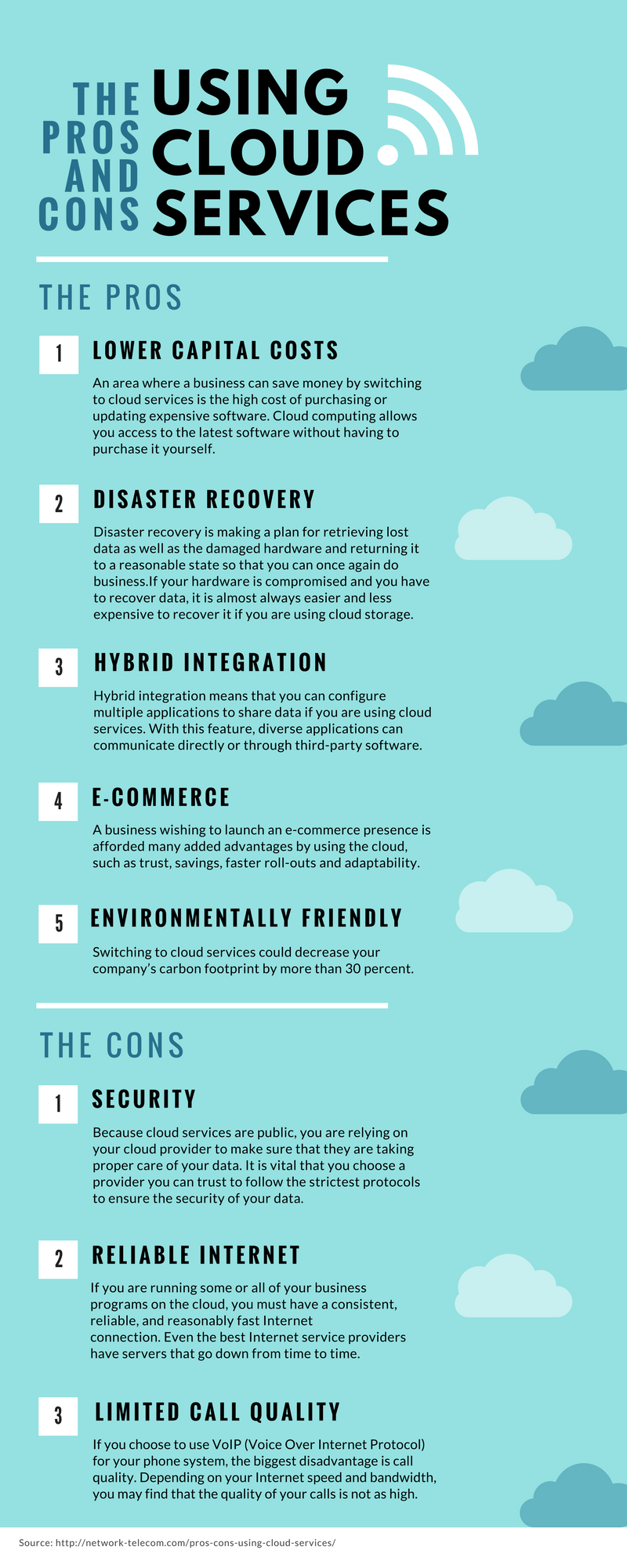
Cloud services are one of the fastest growing trends in the business world today. Many organizations, no matter what their size, are moving all or some of their current IT operations to the cloud. More and more applications are also being developed specifically for the cloud. If the cloud seems to be taking over the IT world, does that mean that it’s the right move for your business? Not necessarily. There are many pros and cons of using cloud services which we will take a closer look at in this post. It’s important that you are aware of these and that you make an educated decision based on the needs of your particular situation before jumping on the “cloud bandwagon.” If you would like some help in making that decision, contact Network Telecom. We offer a free consultation service to help you determine if switching to the cloud is right for your business.
TECHNICAL SUPPORT – 24 HOURS A DAY, 7 DAYS A WEEK, 365 DAYS OF THE YEAR.
1-866-764-7866
519-748-2226 x600

The Pros and Cons of Cloud Services
If you are using cloud services, this means that you are storing and accessing some or all of your data and programs over the Internet and not on a computer hard drive or server that is physically located at your business. As we stated above, it is a good idea to carefully consider all of the pros and cons of cloud services before making the switch. Your business is unique, so just because many other businesses are switching doesn’t necessarily mean that it is the right decision for your business. Taking a closer look at all of the advantages and disadvantages of cloud services will hopefully help you make an informed decision. Here’s a simple summary infographic, continue on to learn more specifics!

Pros
Switching to cloud services has many attractive advantages, including:
- Lower capital costs
- Disaster recovery
- Hybrid integration
- E-commerce
- Environmentally friendly

Lower Capital Costs
An area where a business can save money by switching to cloud services is the high cost of purchasing or updating expensive software. Cloud computing allows you access to the latest software without having to purchase it yourself. It’s included along with your monthly hosting fees. In addition, you will not have to purchase and maintain your own servers, which is another huge area for savings. It also takes away the expense of increasing your server’s memory, hard drive space, and processing power as your business needs grow.
Disaster Recovery
There is a difference between disaster recovery and a backing up your data. According to smallbusinesscomputing.com, backing up your data means you make a copy of your data and then store it somewhere safe. Disaster recovery is making a plan for retrieving lost data as well as the damaged hardware and returning it to a reasonable state so that you can once again do business.If your hardware is compromised and you have to recover data, it is almost always easier and less expensive to recover it if you are using cloud storage. With the cloud, you can also configure your system to automatically back up your data so that you can recover the most up-to-date information that you have.

“I was very happy with the cut-over day, everything got done faster than I expected, and very accurately. Post cutover, Matt has been a great resource, helping make a few tweaks and adjustments here and there and I anticipate I will be bouncing things off of him for a while yet, and his replies are greatly appreciated.”
Brad Davis, FaithLife Financial
Hybrid Integration
Hybrid integration means that you can configure multiple applications to share data if you are using cloud services. With this feature, diverse applications can communicate directly or through third-party software. This means that your staff can access data in real time from any device that has an Internet connection such as a tablet, laptop, personal computer, or mobile phone. According to searchcloudapplications, they can even share personal data such as calendars and contact lists from different applications

E-Commerce
A business wishing to launch an e-commerce presence is afforded many added advantages by using the cloud. These include:
- Trust: You can tap into the trust already established by e-commerce pioneer companies such as Google and Amazon by pointing out that your sales platform is managed and secured by one of these companies your customers already feel confident using.
- Savings: According to VI.Net, a cloud-based e-commerce site on a virtual server could cost 80% less than a traditional e-commerce start-up.
- Faster Roll-Outs: An e-commerce site can be started about 5 times faster than a traditional one, therefore your company can begin selling much quicker as well.
- Adaptability: Cloud services can allow your business to quickly expand and are also great for supporting seasonal spikes in sales or spikes due to special sales or promotions.

Environmentally Friendly
According to smallbusinesscomputing.com, switching to cloud services could decrease your company’s carbon footprint by more than 30 percent. The savings in energy usage can be even as much as 90 percent for smaller companies. Saving energy is not only a huge cost savings but is also a great way to project a more positive, eco-friendly image for your business.
Cons
Along with the advantages of cloud services, it is a good idea to weigh the disadvantages. They include such considerations as:
- Security
- Reliable internet
- Limited call quality

Security
Making sure that your data is secure is a big concern for most businesses. Because cloud services are public, you are relying on your cloud provider to make sure that they are taking proper care of your data. It is vital that you choose a provider you can trust to follow the strictest protocols to ensure the security of your data. If your company deals with highly sensitive data or it must meet strict compliance guidelines, you may still want to have your own IT department make sure that it is secure. On the other hand, if your IT department does not have the technical expertise or the proper resources to maintain the level of security that you require, then putting it on the cloud may offer you better security than you could achieve in-house.

Reliable Internet
If you are running some or all of your business programs on the cloud, you must have a consistent, reliable, and reasonably fast Internet connection. If your service provider loses connectivity, or they are experiencing an outage, then your business cannot function either. Even the best Internet service providers have servers that go down from time to time, so if you are relying on them, then it is a good idea to have a backup plan in place.
Limited Call Quality
If you choose to use VoIP (Voice Over Internet Protocol) for your phone system, the biggest disadvantage is call quality. VOIP has improved since its inception, however, depending on your Internet speed and bandwidth, you may find that the quality of your calls is not as high.

How Network Telecom Can Help Your Business
Network Telecom has a team of telecommunication and networking experts who are ready to offer sound advice, help with technical issues, and even find ways to save you money on your monthly service bills. Our trained technicians are available to help 24 hours a day, 7 days a week, 365 days a year. We also carry a huge selection of parts in order to quickly solve any components issue you are experiencing. If you are having a telecommunication or networking issue, we can resolve it quickly and professionally.
In addition to our accredited and certified technical expertise, we offer:
- Consultative Sales
- Cloud Services
- Ongoing Support
- System Design + Consulting
- System Admin + User Training
- PA Systems
- VoIP Specialist
- Network Cabling
Contact us today for all of your telecommunication questions and concerns; we’d be happy to help you.
![]()

